Eva Bartok | home 
BIOGRAPHY Page 2
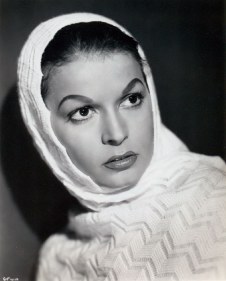 Eva: the look of love
|
Part 4: SUCCESS AND INTRIGUE
"Time and The Conways" ran at the Belvàrosi Szinhàz for three months, which was unusually long at the time. Her next play would prove even a greater success and a turning point for Eva, both as an actress and as a woman. It was called "New God in Thebes", a farce written by one of Hungary's most popular writers Áron Tamási. The play and Eva's performance were enthusiastically received by critics and audiences including Mr. Tamási himself, who, one glorious evening, materialized at Eva's dressing room to pay his respects. It was love at first sight. In spite of the differences in ages, he was forty something, she was barely twenty, author and actress developed an intense relationship which sometimes overwhelmed
them both.
It was like a new beginning for each: he had renewed his youth with her and she had found in him the guidance she longed for since her father's disappearance. Furthermore, she became his inspiration, his muse, while he helped her regain the confidence in men, a confidence shattered during the terrifying days of her first marriage. However, dark forces were conspiring in the background against the couple...
|
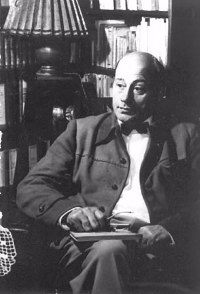 Áron Tamási (1897-1966)
|
Tamási wrote a play for her which was produced at the National Theater and was a great success on opening night. Eva and Tamási stood side by side on stage to acknowledge the ovations of the enthusiastic audience. The following morning they were in for a shock: Communist-controlled publications were unanimous in panning both the play and the performances.
They could not explain it but the situation became clear days later: the military authorities wanted both Eva and Tamási to join the Communist Party. In order to avoid a formal confrontation, the couple left the option "open for the future" and went on to work in one of the last independent films made in Hungary "The Prophet of the Fields" written by Tamási and starring Eva in her film debut. (Some sources claim that she was credited on the film as Eva Martha Szöke )
To prove that they meant business, the authorities banned the film one day before its premiere. It was a clear message they could no longer ignore and a painful decision was made by Tamási. Eva must leave the country while he would stay and challenge the communists. He was a national hero, adored specially by the peasants and workers in whose language he wrote. It would be difficult to mess with him, but the authorities were getting at him through his weak side: Eva. If she left, he would most likely survive the pressure and, after all, she was young, beautiful, talented and deserved the opportunity to develop somewhere in freedom. It was an agonizing decision but they both realized it was the only way to go.
|
Part 5: ONE WAY TICKET
Once the decision was made, the problem arose that it was almost impossible to leave the country. Following the example of other actors who wanted to get away, Eva started sending her photographs, resumé and notices to producers abroad, mostly to London and Hollywood, but a long time passed before she got a couple answers. One came from Arnold Pressburger, President of Two Cities Films, inviting her to a screen test in London, all expenses paid. With that letter, Eva was able to get a passport and a visa, but, at the last minute, the offer was canceled.
The other came in a letter from Alexander Paal, a Hungarian film producer now residing in Hollywood, who had been a friend of her father. He offered a starring part in a movie to be made in England and he also suggested that he could marry her in Budapest in order to take her out of the country. After consulting the strange proposition with her mother and with Áron, Eva wired her acceptance.
When Paal arrived, their first meetings were awkward. Here was a total stranger talking to Eva about marriage but he also talked a lot about Eva’s father, how kind he was to him when he was younger and how much he was indebted to him. Of course this broke the ice and they became good friends. They were married a few days later and prepared to leave for England. With heavy hearts, Eva and Áron decided not to see each other again but the worst was yet to come.
|
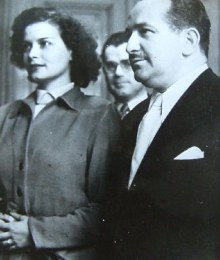 A young and tense Eva with Alex Paal in London, 1948
|
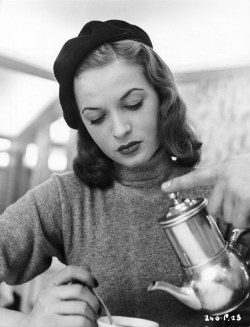 Eva having tea in London.
|
The time to say goodbye to her mother was approaching and both women were devastated. They had never been away from each other, not even during the war, but now they couldn't avoid it. At the last minute the British Consulate refused the necessary documents and Eva was on square one all over again. An anonymous employee saved the day by reminding Eva that the visa she got previously to go to London was still valid. Ironically, Eva left Hungary with new husband Alex using a permit that showed her... unmarried!
Part 6: THE COST OF FREEDOM
The first days in London were full of excitement for Eva. She was quite impressed by the city's beauty and freedom. But as weeks passed the novelty wore off and she began missing her mother, her culture, her language. It is not clear who came up with the idea of new name for the actress, but it was obvious that "Eva Szöke" would not do for English or for international audiences. "Bartok" was chosen, after the well known Hungarian composer Béla Bartók, an idea that could have originated with Alex Paal or Eva herself. It is not clear either what part Paal played in Eva's life at this point but he did fulfill his promise and featured her in one of his films "A Tale of Five Cities", an international project produced sometime in 1948 that ran into financial difficulties. The movie would not be completed and shown until 1951.
|
Meanwhile the young actress found herself alone and lost in London. It is probable that Paal had to return to his commitments in Hollywood and divorced Eva shortly after their arrival in England. After all, it had only been "a marriage of convenience." Fortunately the young actress found other friends in the Hungarian community and they arranged for her an interview with film mogul Alexander Korda president of London Films and MGM-England. Korda, himself a Hungarian, was impressed by Eva’s theater reviews and signed her to a movie contract for 80 pounds a month. He was also very clear in what he could and could not do to advance her career.
She would have enough money to live modestly and help her mother out; she would be assigned an English teacher to help her with the language so that Eva could participate in as many screen tests as possible; none of this guaranteed any kind of work since the casting of films depended entirely on directors and producers. Mr. Korda explained that he would make her tests available to as many people as possible but he would not interfere by recommending her for any parts since this could be misunderstood as favoritism. "They might think I am helping you because of our common nationality or, worse, they might think you are my girlfriend. "In either case your credibility as an actress will be shattered"-said the experienced Korda. Eva understood and was grateful to the man forever, always referring to him as "one of the kindest men I've ever met."
|
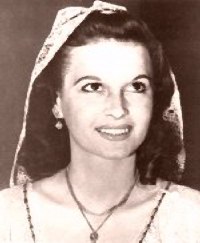 Eva in London: lots of publicity but no work!
|
She immersed herself into her English classes and attended constant requests for film tests. She rehearsed constantly at home full of hope that her efforts would pay off in time. However hope turned into despair as months passed and she got no film offers except for a bit part in "Madeleine" (1950) starring Ann Todd. On top of it all, the correspondence from her mother became more alarming. The Communists were tightening their grip on Hungary and were very suspicious of citizens who had relatives abroad regarding them as "deserters and traitors." She knew she had to get her mother out but no idea as to how. Alexander Korda came to the rescue by advising her to fly to Austria where most of the refugee smuggling was taking place. He would help finance the whole operation. Eva took on the dangerous mission with determination and hope in her heart. The ordeal lasted several weeks but she was able to smuggle her mother out of Hungary into Austria, then out of Austria to Germany and finally into France where refugees were accepted and protected by law. They had a cousin living in Glenoble and her mother stayed there while Eva flew back to London to proceed with more film tests.
|
Now that her mother was safe, Eva was more relaxed and could expand her circle of friends. She met a kind English gentleman named William Wordsworth (a descendant of the famous poet) and there was instant chemistry between them. He was a public relations man for several West End theaters and he came up with a plan that seemed logical enough. Eva would continue her film tests during the day, but at night she would attend as many theater premieres as were available to him. With that strategy, Bill expected to make Eva known in theater circles and maybe land some stage work. The first problem to tackle was wardrobe. Eva could not afford "haute couture" with her small salary from London Films so she decided to sew her own gowns and accessories from "scraps of these and that" according to her own words. Some of the outfits, specially the hats, were so unique that they immediately attracted media attention. It was the ultimate irony that Eva Bartok became a household name in the U.K. not for acting but for her unusual wardrobe. Soon the word was out: "Eva Bartok? Oh, you mean the girl in the crazy hats!"
Eva had mixed feelings about her new found fame. She was happy to see her name in newspapers and magazines but she also found the whole thing unfair and ridiculous. She attended these play openings and the following day the media had more coverage of her -and her hats- than of the actors that worked in the plays and deserved the publicity for their efforts. It became a huge problem for her specially when the original plan did not seem to be working. She was not getting any offers for stage or film work , thus the actress inside her felt frustrated and humiliated.
|
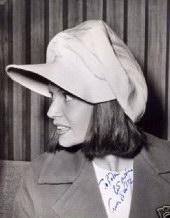  |
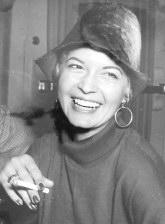 Eva Bartok?
The girl witth the crazy hats!
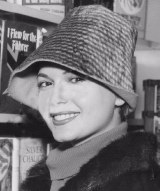 |

 Back to to
Back to to